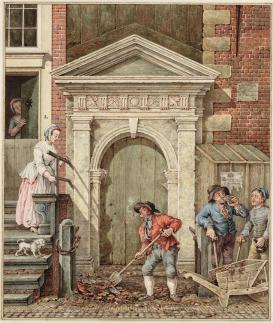My research focuses on the history of oeconomic chemistry and recycling in Western Europe, 1700–1830. The term "oeconomy" loosely referred to the principles of prudent and frugal resource management. Chemists across Europe embraced the reuse of industrial leftovers and processing of accumulating city garbage as central to proper oeconomy. Labeled as neglected and usable "waste," discarded artefacts such as burnt ash residues, industrial kettle scrapings, or putrefying street filth thus came to embody political attributes. They linked oeconomic imaginaries of thrift, productivity, self-sufficiency, responsible citizenship, and public health. In my research, I examine how these imaginaries drove developments in chemical material and knowledge production, and how chemistry, in turn, helped to shape and reinforce collectively imagined forms of "oeconomic" order.
In the Netherlands, academic chemists, apothecaries, and chemically trained physicians participated in two main oeconomic projects: first, the reallocation of industrial peat and wood ash and urban street filth in rural areas as fertilizer for producing vegetable raw materials that, in turn, supplied urban factories; and second, the on-site policing of common salt refineries in order to produce both high-quality preservatives for agricultural yields and appropriate salty leftovers to be recycled in chemical industry. Chemists helped to design and enact state regulations along these lines, proposed as ways to govern urban hygiene, soil fertility, and the scale of agricultural and industrial production. Newly developed chemical classifications of plants and salts reaffirmed this oeconomic material order, collectively imagined as the base for a peaceful and productive community life.
Dutch chemists built on innovations in recycling and analyses of fertilizers and salts made by German apothecaries and academics, while German officials visited and reported back on Dutch saltworks and recycling plants. During my stay at the Max Planck Institute in Berlin, I will further explore these Dutch–German interconnections.

